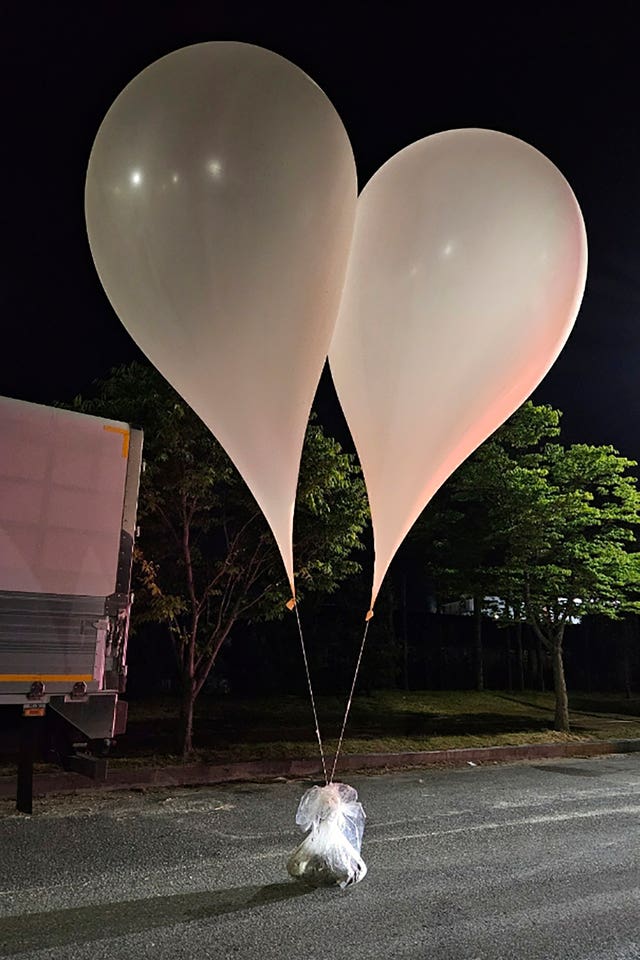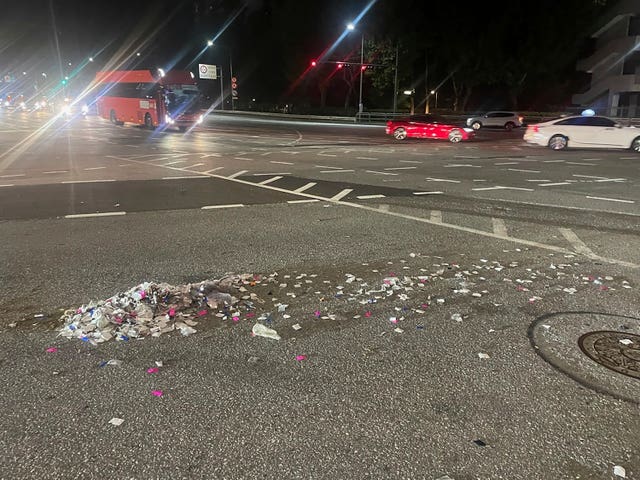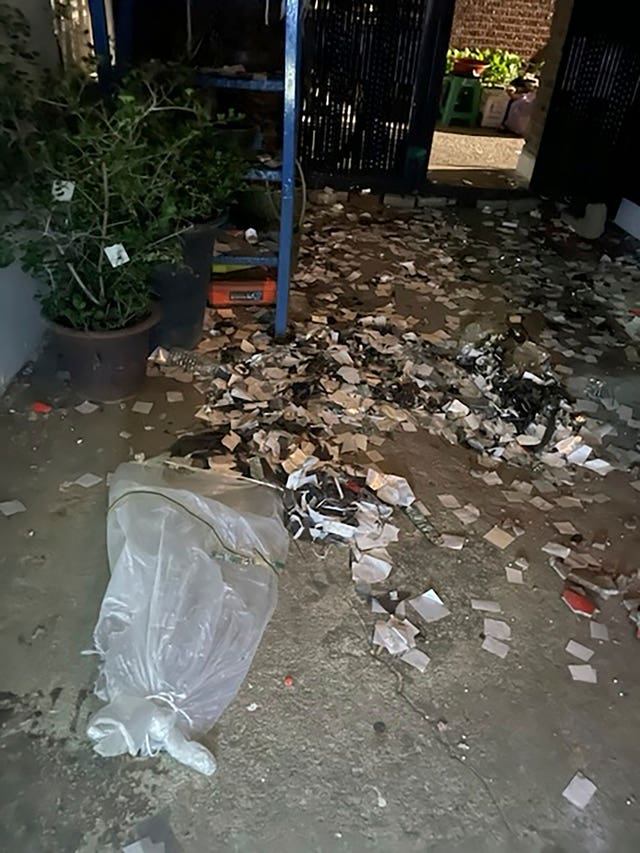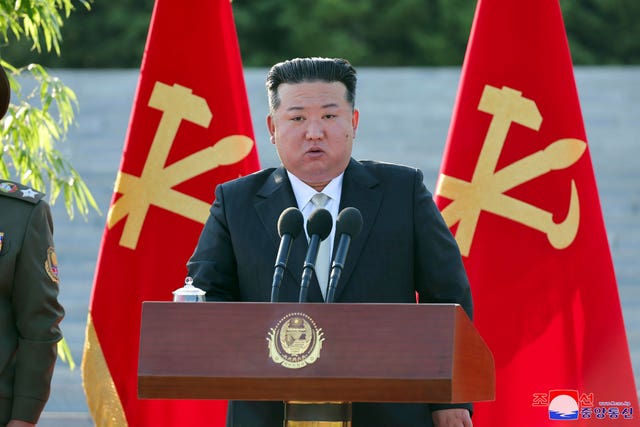
Clive Bull 1am - 4am
29 May 2024, 14:14

The activity is an apparent retaliation against South Korean activists for flying anti-Pyongyang propaganda leaflets across the border.
North Korea has flown hundreds of waste-carrying balloons towards South Korea in one of its most bizarre provocations against its rival in years, prompting the South’s military to mobilise chemical and explosive response teams to recover objects and debris in different parts of the country.
The ballooning campaign came as North Korean leader Kim Jong Un urged his military scientists to overcome a failed satellite launch and continue developing space-based reconnaissance capabilities, which he described as crucial for countering US and South Korean military activities, state media said.
In his first public comments about the launch failure, Mr Kim also warned of unspecified “overwhelming actions” against South Korea over an exercise involving 20 fighter jets near the inter-Korean border hours before North Korea’s failed launch on Monday.

In a speech on Tuesday, Mr Kim described the South Korean response as a “hysterical attack formation flight and strike drill” and “direct military challenge” towards North Korea, the North’s official Korean Central News Agency said on Wednesday.
In another sign of tensions between the war-divided rivals, South Korea’s Joint Chiefs of Staff said North Korea has also been flying large numbers of balloons carrying rubbish towards the South since Tuesday night, in an apparent retaliation against South Korean activists for flying anti-Pyongyang propaganda leaflets across the border.
The South’s military said about 260 North Korean balloons were found dropped in various parts of the country as of Wednesday afternoon and were being recovered by military rapid response and explosive clearance teams.
It advised civilians not to touch the objects flown from North Korea and to report them to the military or police after discovering them.
Photos released by the military showed rubbish scattered across highways and roads in different parts of the country.
In the capital Seoul, military officials found what appeared to be a timer that was likely to have been designed to pop the bags of rubbish mid-air.
In the central South Chungcheong province, two huge balloons carrying an un-popped plastic bag filled with dirt-like substances were seen at a road.

There were no immediate reports of damage caused by the balloons.
Similar North Korean balloon activities damaged cars and other property in 2016.
In a statement issued over the weekend, North Korean vice defence minister Kim Kang Il said the North was planning to scatter “mounds of wastepaper and filth” over border areas and other parts of South Korea, in what he described as “tit-for-tat” action against the leafletting by South Korean activists.
Later on Wednesday, Kim Yo Jong, the North Korean leader’s powerful sister, took to state media to ridicule a South Korean military statement demanding that the North stop its “inhumane and vulgar activity”.
She said the North was merely exercising its freedom of expression, which the Seoul government has stated as a reason for its inability to stop anti-North Korean activists from flying leaflets across the border.
“Once you experience how nasty and exhausting it feels to go around picking up dirty filth, you will realise that you shouldn’t talk about freedom of expression so easily when it comes to (leafletting) in border areas,” she said.
“We will make it clear that we will respond with tens more times the amount of filth to what the (South Koreans) spray to us in the future.”
Kim Jong Un’s comments about the satellite were from a speech at the North’s Academy of Defence Sciences, which he visited a day after a rocket carrying what would have been his country’s second military reconnaissance satellite exploded shortly after lift-off.
North Korea’s aerospace technology administration said the explosion was possibly related to the reliability of a newly developed rocket engine that is fuelled by petroleum and uses liquid oxygen as an oxidiser.
Animosities between the Koreas are at their worst level in years as the pace of both Mr Kim’s weapons demonstrations and South Korea’s combined military exercises with the US and Japan have intensified since 2022.
The failed satellite launch was a setback to Mr Kim’s plan to launch three more military spy satellites in 2024 after North Korea’s first military reconnaissance satellite was placed in orbit last November.
The November launch followed two failed attempts.
Monday’s launch drew criticism from South Korea, Japan and the United States, because the United Nations bans North Korea from conducting any such rocket launches, viewing them as covers for testing long-range missile technology.

North Korea has steadfastly maintained it has the right to launch satellites and test missiles in the face of what it perceives as US-led military threats.
Mr Kim has described spy satellites as crucial for monitoring US and South Korean military activities and enhancing the threat posed by his nuclear-capable missiles.
“The acquisition of military reconnaissance satellites is an essential task for our country to further strengthen our self-defence deterrence … in the face of serious changes to our nation’s security environment caused by US military manoeuvres and various provocative acts,” Mr Kim said.
North Korea has not commented on when it would be ready to attempt a satellite launch again, which some experts say could take months.
State media’s mention of a liquid oxygen-petroleum rocket engine suggests the North is trying to develop a more powerful space launch vehicle that could handle larger payloads, according to some South Korean experts.
It is believed that North Korea’s previous space rockets used unsymmetrical dimethylhydrazine as fuel and dinitrogen tetroxide as an oxidiser.
The country’s swift transition in space rocket designs possibly indicates external technological help, which would probably come from Russia, said Chang Young-keun, a missile expert at South Korea’s Research Institute for National Strategy.
Mr Kim has been boosting the visibility of his ties with Russia in recent months, highlighted by a summit with Russian President Vladimir Putin in September, as they align in the face of their separate confrontations with Washington.

Mr Kim’s meeting with Mr Putin was held at a spaceport in the Russian Far East and came after North Korea’s consecutive failures in its attempts to launch its first spy satellite.
Mr Putin then told Russian reporters that Moscow was willing to help the North build satellites.
The US and South Korea have also accused North Korea of providing Russia with artillery shells, missiles and other military equipment to help prolong its fighting in Ukraine.